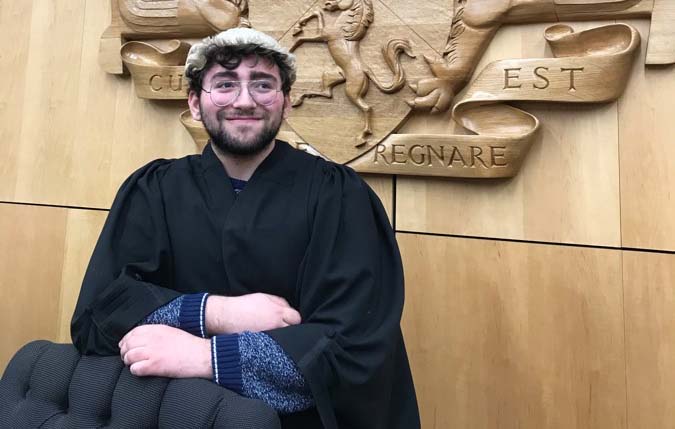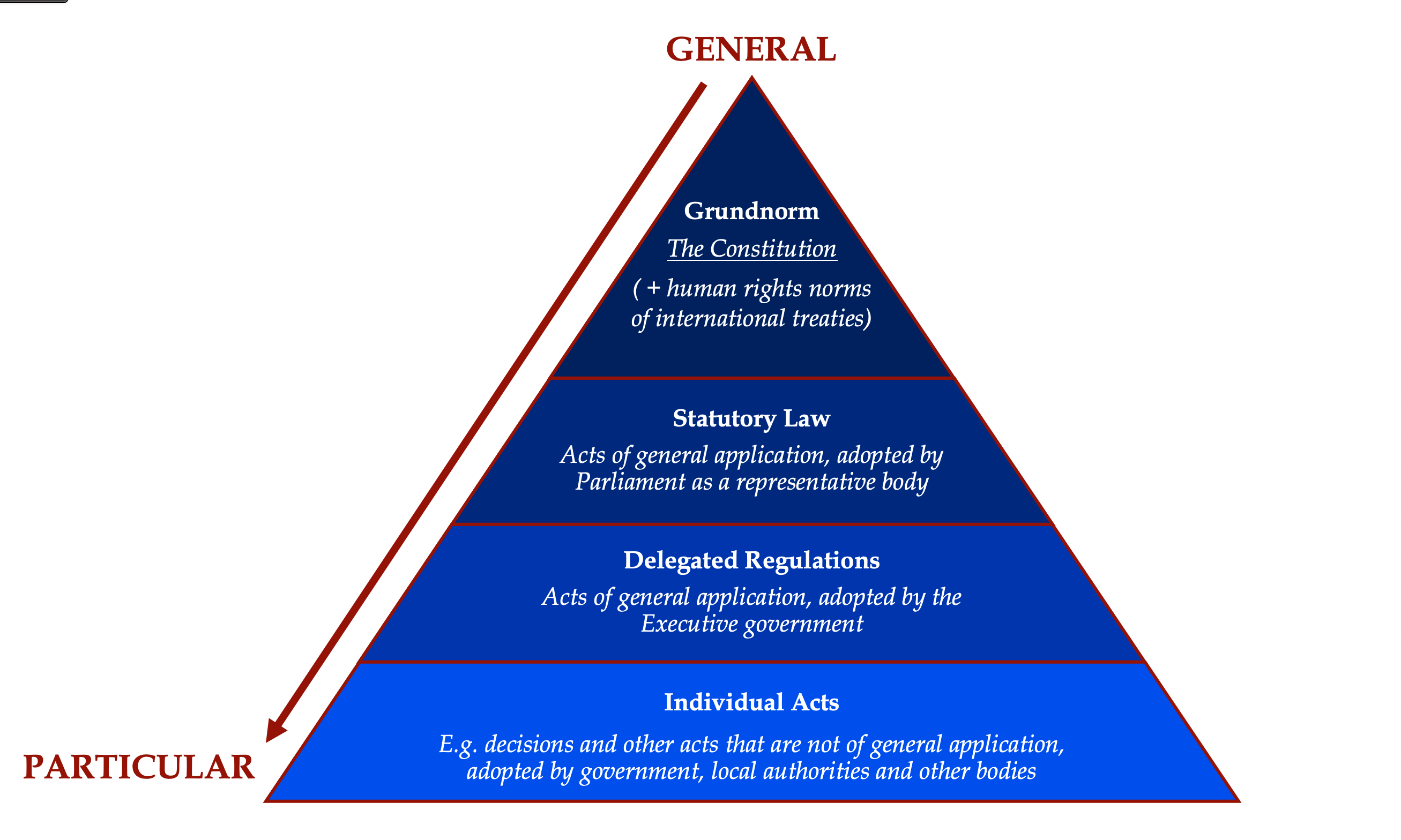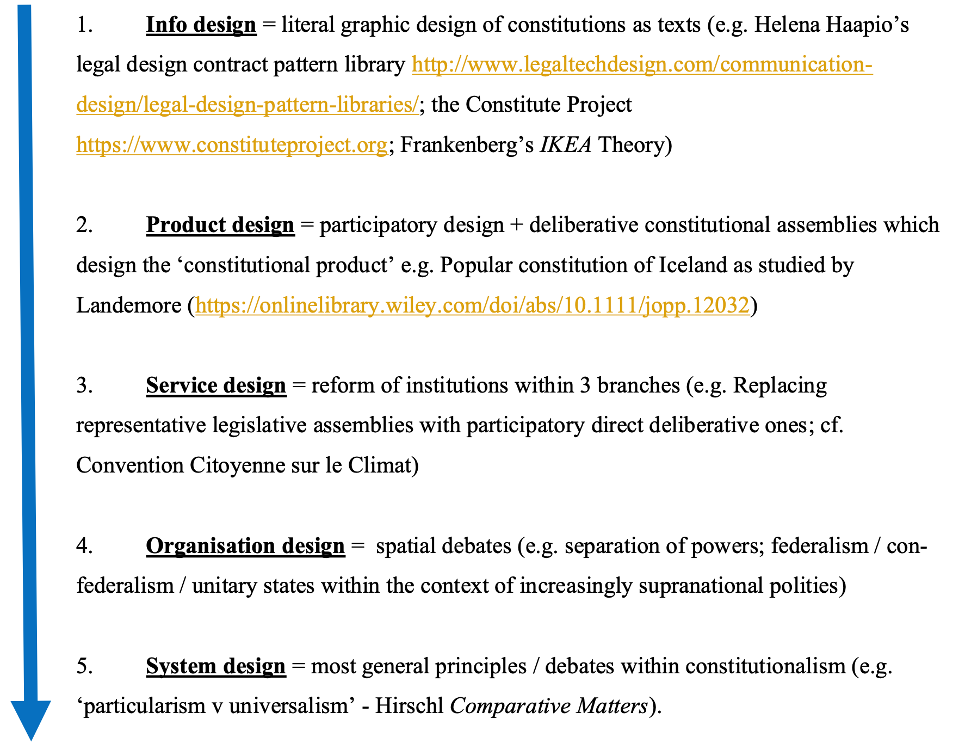I am currently undertaking an LLM by Research at Kent Law School, under the supervision of the wonderful professors Amanda Perry-Kessaris and Anneli Albi. My thesis is exploring a combination of their respective fields, by looking at how the potential applications of ‘socio-legal design’ to comparative constitutional law could make governance more legitimate and innovative.
I studied my undergraduate LLB in Law & Criminology at Kent as well, and graduated this past summer, with the honour of receiving the ‘Special Award for the Best Contribution to Kent Law School’. Though I am not sure I earned such a distinction, I do believe that I made the most of my time and the opportunities available at KLS to explore alternative pathways for law graduates.
As many of you will be aware, budding law students are often presented with the following familiar route forward through their degrees: to find a field of interest within our legal studies, most often related to commercial law, and then choose between either becoming a barrister or a solicitor. What follows is a stressful onslaught of mini-pupillage and eventually pupillage applications; a quest to find the ever elusive ‘commercial awareness’; schmoozing with commercial firms at careers fairs and networking events; choosing allegiance to an Inn of Court; and finally moving on to the next degree, be it to qualify for legal practice, or to first specialise in a field of law with a taught master’s.
I’d like to emphasise that I don’t have anything personally against this career path or those who choose to follow it, and indeed it can be very lucrative and fulfilling, thus its popularity, and indeed competitiveness. However, it was my feeling throughout my undergrad studies that this was often presented as the only way forward, and thus many of my colleagues struggled to conform, despite it not necessarily aligning with why they chose to study law in the first place. In any case, as I can only speak to my experience, what follows attempts to relate my own journey through my LLB.
Why Kent Law School?
Personally, I came to study at KLS out of a sense of altruism, as I know many others have and still do – the (perhaps naïve) hope that somehow through studying and practicing law, we can find meaning in making the world a slightly better place. When I began I was convinced I wanted to specialise in Criminal Law, though I did not yet understand it, and I was determined to get a taste of the legal system in practice alongside my studies – for I did not find the readings and case notes to be as stimulating as the ‘real thing’. From the outset, my joint degree in both Law and Criminology gave me a different perspective on the opportunities available at Kent, and how to navigate through them.
I was very lucky to have the support of KLS’ own splendid Jayne Instone, a dedicated careers and employability advisor for law students, who was my first point of call, and who I highly recommend to anyone seeking to gain legal work experience before they graduate. By the end of my first year, and largely thanks to Jayne, I had secured a mini-pupillage with a criminal barrister, and I began volunteering as an Appropriate Adult with the Young Lives Foundation, as well as a McKenzie Friend with the Domestic Abuse Volunteer Support Services. I was excited to have the opportunity to learn about how Criminal Law worked in practice around Kent, and to be involved in real cases. I was able to apply what I had learned from my degree to the work experience and vice versa, which gave my legal studies a more holistic feeling. The volunteering gave me a sense of the gravity and responsibility entailed by legal practice, as well as my first experiences aiding and even sometimes representing people in local police stations and courts. I felt like a ‘mini-lawyer in training’, as well as the happiness in being able to make a real positive difference in somebody’s life through law, thus already as a student fulfilling my initial altruistic goal.
On our campus, I began to engage regularly in the amazing mooting programme at KLS, now passionately run by Darren Weir; and I joined the Law Clinic, working on the Joint Enterprise Appeals Project for JENGbA. I took on the extra-curricular module in Negotiation, and I did my best to go to the dedicated student law societies’ and law school’s events which interested me. Through all of this I gained in legal advocacy, argument and research skills, as well as a deeper understanding of the law and the more abstract philosophy underpinning it. Kent indeed prides itself as a ‘Critical Law School’, and thus we are lucky to be able to study in an innovative and progressive research environment, that goes beyond traditional doctrinal understandings of law by boldly fostering alternative and sometimes radical perspectives.
It is therefore in keeping with the critical ethos of KLS that I encourage law (and non-law) students to question the standard career path, and explore the wealth of opportunities that Kent has to offer. By engaging with your field alongside your studies as it works in practice, you take an extra step that many don’t make time for, and easily differentiate yourself, thus standing out and increasing not only your employability, but your passion for and understanding of the subject you are dedicating you career to!
A passion for Public Law
These extra-curricular experiences also organically lead me to discover a passion for Public Law which I would not have expected or necessarily found otherwise, and I am now on my way towards specialising in that field. I learned along the way that if you take the time to reach out to someone whose work inspires you, with a kind email relating your own experience and goals to theirs (and a good CV), you are very likely to receive a response, even if you feel they are too busy or successful to notice a simple student like yourself! I therein found myself in my second year on a clerkship with a senior public defendant in a court in Los Angeles, working on a death penalty case. I am half-French and half-American, and I wanted to make the most of my international background to explore different legal cultures. Experiencing the American legal system first hand led me to a great interest in Comparative Law, which is a module I would highly recommend here at KLS, brilliantly taught by Professor Simone Glanert. However, I also realised the importance of the Constitution to the proceedings, and witnessed how the lawyer I was clerking for made public, not criminal, law arguments to save a boy my age from death row. I became passionate about constitutional law, and the implications of governance on a plethora of world issues; especially in the context of what was then the aftermath of both Brexit and the Trump administration.
Back on campus, I presented my first ever paper at the Kent Critical Law Society’s annual conference on issues within American constitutionalism, and I applied for KLS’ legal research assistantship scheme, which I thoroughly enjoyed. I began to reach out to professors and barristers in public law, and had the luck to join a community of passionate constitutional lawyers through various experiences, such as taking part in the Sorbonne’s summer school on comparative law in Paris; being invited by the former president of the ACLU Nadine Strossen to a conference at the Law Society in London, where I had the pleasure to meet US Supreme Court Justice Stephen Breyer; or taking part in a fast-paced mini-pupillage with Tom Hickman QC at Blackstone Chambers.
I found that some of my friends in law and other degrees struggled to find a particular area they were passionate about; to specialise in within their studies and pursue as a career. However, anyone I know who pursued extra-curricular experience was able to then either rule out a possibility as something they found out they didn’t enjoy, or on the other hand to discover a passion for something they would never have realised they did feel stimulated by. Law in particular holds a wealth of possibilities for its graduates. Beyond the barrister/solicitor dichotomy, there are many other possible jobs in and out of the legal sector one can pursue, that are worth exploring – and the best way to find out is to reach out to people you admire and try to get experience outside of your course! In this way you can try to marry your need for a stable career to a genuine passion or interest of yours.
The academic path
In my case, I realised that with everything I was learning about outside of class, I was necessarily spending less time within the degree’s curriculum and structure. My growing interest in comparative constitutional law did not seem to be represented on any undergraduate modules in the way I enjoyed it, nor on the taught LLMs I was beginning to look at. I came to learn that there is another path after the law degree, and that is the academic one. Before coming to university, I thought academia was for much older and smarter people, and it seemed somewhat inaccessible. However, throughout my studies, many of my professors either had or were studying PhDs, and were not that much older than I was; which demystified academia as a potential avenue to pursue.
Kent Law School offers a rare course not known to many and not available at every university: a Master’s by Research (LLMRes), which is the course I am on now. It’s a 12 month-course with a requirement for a 40,000 word thesis. You are treated as a doctoral student in training, and provided with two supervisors, to support your research on any topic of your choosing. I was attracted to the freedom of the LLMRes, both substantially and in terms of structure; as I had learned in my LLB that I learned and worked best alone. Further, this would provide me the chance to specialise in and further my understanding of specifically the areas of law that interested me, rather than have to be examined in mandatory modules I didn’t enjoy. This is not to say that this path is for everyone, nor that that it doesn’t hold its challenges.
With the freedom comes a lack of structure and an infinitely large amount of choice as to what to write about which can sometimes feel overwhelming. In my final year of my undergraduate degree, I was faced with the obstacle of coming up with an original, specific research proposal with a solid theoretical and methodological foundation. I had never undertaken such a task before, and the stress of my final year paired with my Master’s applications was difficult. But the community of professors both in KLS and other universities were very supportive in guiding me through the process, and I am very happy now that I have made it onto the degree.
Our community of first year postgraduate researchers at KLS, includes two other LLMRes students, and around 13 starting their PhDs. Compared to graduates who go on to do taught LLMs, qualifying legal practice degrees, or go directly into a professional environment, academia is not such a well-known career path! Nevertheless, I have found myself surrounded by an intimate and supportive cohort of researchers with an astonishing range of ages, backgrounds, experiences and research interests. We are treated to exceptional opportunities reserved for postgraduate researchers, and I find myself rediscovering KLS from a different and more collaborative perspective than that of an undergraduate student. I have found the degree to be immensely fulfilling and stimulating so far, and I highly recommend any students interested to look into the programme.
As a KLS graduate, you are entitled to an alumni tuition discount, and you can continue to work with the connections you made during your undergraduate studies, which is largely part of the reason I decided to stay on at Kent myself for my Master’s; notwithstanding the fact that I love living in Canterbury. Additionally, I chose to undertake my LLMRes here for the research environment, which I alluded to before. The academics at KLS take part in exciting and important work, and represent a wide array of different fields to specialise in and engage with.
Introducing socio-legal design
In my KLS legal research assistantship, I was assigned to Professor Amanda-Perry Kessaris, who I am now grateful to have as my supervisor, where I was introduced to her exciting work on the emerging field of ‘socio-legal design’. I then took part in the 2020 Legal Design Sprint, and led a team on behalf of KLS, which I wrote about for this blog before the summer, if you want to learn more. For my research, I wanted to apply this pioneering research to the field of comparative constitutional law, that is the study of governance abstractly across all polities, which I perceive to be stuck in many formalistic and superficially binary debates (eg national vs global constitutionalism). I am lucky therefore to also be supervised by Professor Anneli Albi, who has accomplished important comparative research on the national constitutions of the EU.
My LLMRes thesis is therein going to take the shape of a propositional essay (leading towards a PhD) introducing ‘applications of socio-legal design to comparative constitutional law’. My research aims are to elucidate the potential for the combination of both fields (rather than a holistic account), and to show that socio-legal design can be an innovative tool to challenge the formalism and dichotomies in which constitutional theory and practice appear to be trapped. If governance can be reimagined to be more modern and legitimate, it can positively impact many other societal issues which are tied to politics.
Conceptually, I will illustrate my argument of bringing the two fields together via the paradigm of Hagan’s ‘Legal Design Pyramid’ in parallel with Hans Kelsen’s ‘Pyramid of Norms’ (Pure Theory of Law, 1967):
Both pyramids can be used to explain what is ‘designerly’ and what is ‘constitutional’, therefore serving as an introduction to the subjects of socio-legal design and comparative constitutional law. Further, they have graphic parallels in their opposite depictions of hierarchy and abstraction; and this methodology will give my research a structure and sense of direction. My thesis will comprise several internal case studies, in which I posit grounded examples of applications of socio-legal design to comparative constitutional law, from the general to the particular, each step forward along the pyramid being more or less abstract.
Some initial ideas and examples of how I will apply Hagan’s legal design pyramid to constitutionalism in theory and practice are with these potential case studies:
These research ideas however are still tentative and conceptual, and may change and evolve as I move forward: such is the nature of legal research! Going forward, I plan on continuing my research at a doctoral level, and I am currently in the process of sending off my PhD applications. I am strongly considering staying on at Kent, due to the community and research environment, as well as the funding and teaching opportunities. However, I am interested in continuing to experience other legal cultures, and thus may travel to study diverse constitutional arrangements in different polities. I love academia and will definitely somehow incorporate it into my career, but I nonetheless still enjoy advocacy and legal practice work. If I qualify for the bar either in the UK or the US, I may be able to work on cases specifically relevant to my research interests. In any case, there is no specific career path for what I know I want to do, so I am working my hardest to create an original path unique to me. After all, there is less competition, more freedom and fulfilment, and a certain curiosity people acquire when you succeed in finding your own way off the beaten path.
Thus concludes a long-winded account of how I personally approached my law degree, and ended up doing a Master’s by Research. For anybody intrigued by any of the experiences I undertook as an undergrad (the YLF and DAVSS are always looking for new volunteers), by the LLMRes, by my research interests, or anything else, please feel free to look me up, or reach out to me at dhr6@kent.ac.uk! Thank you for taking the time and interest to read about my journey, and I hope it has inspired you to go forge your own path, and make the most of what the wonderful community here at KLS has to offer. Good luck!




